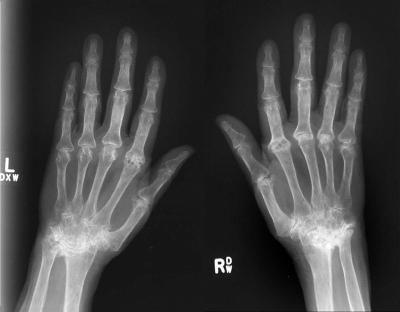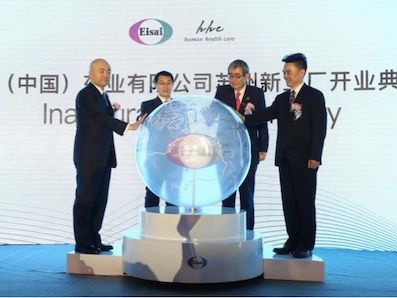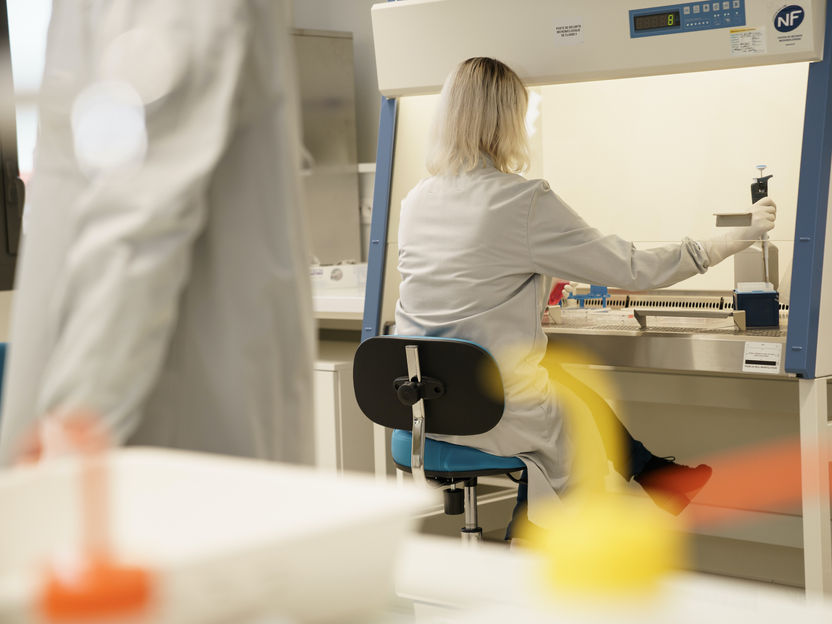Gene regulating severity of tissue damage caused by rheumatoid arthritis identified
Scientists have identified a new (C5orf30) which regulates the severity of tissue damage caused by rheumatoid arthritis (RA).

Severe, rapidly progressive, RA, diagnosed in 1999, and severe damage to finger joints by 2005 are shown
University College Dublin
Following the discovery published in PNAS, rheumatoid arthritis patients most likely to suffer the severest effects of the condition can now be identified early and fast-tracked to the more aggressive treatments available.
Although there is no cure for RA, new effective drugs are increasingly available to treat the disease and prevent deformed joints. Self-management of the condition by patients, including exercise, is also known to reduce pain and resulting disability.
"Our findings provide a genetic marker that could be used to identify those RA patients who require more aggressive treatments or personalised medicine," said Professor Gerry Wilson from the UCD School of Medicine and Medical Science, University College Dublin, who led the research.
"They also point to the possibility that increasing the levels of C5orf30 in the joints might be a novel method of reducing tissue damage caused by RA".
One of the biggest difficulties with treating rheumatoid arthritis is early diagnosis. With early diagnosis and aggressive treatment, it is possible to reduce the damage to the joints caused by RA. Deciding the most appropriate treatment for each patient at the earliest possible stage is central to effectively tackling the condition.
Most read news
Organizations
Other news from the department science

Get the life science industry in your inbox
By submitting this form you agree that LUMITOS AG will send you the newsletter(s) selected above by email. Your data will not be passed on to third parties. Your data will be stored and processed in accordance with our data protection regulations. LUMITOS may contact you by email for the purpose of advertising or market and opinion surveys. You can revoke your consent at any time without giving reasons to LUMITOS AG, Ernst-Augustin-Str. 2, 12489 Berlin, Germany or by e-mail at revoke@lumitos.com with effect for the future. In addition, each email contains a link to unsubscribe from the corresponding newsletter.
Most read news
More news from our other portals
Last viewed contents

Eisai commences full-scale operation of new production site - Strengthening in-house domestic production system in China
H1_antihistamine
Xiao_Yao_Wan
CyGenics Acquires Stake in DNAPro in Exchange for Cell Sciences Subsidiary - Disposes of wholly owned subsidiary, Cell Sciences, in exchange for 20% stake in DNAPro
The Linde Group and Algenol Biofuels agree to cooperate in CO2 and O2 management for biofuel production from algae
HeLa
Major discoveries in maize genetics - Maize findings could lead to vigorous new varieties and insights into human genetics
SHORT_syndrome






















































